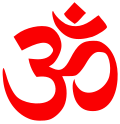William Dalrymple (historian)
Vedanta Desika | |
|---|---|
 Painting of Vedanta Desika (centre) with Brahmatantra Svatantra Jiyar and Kumara Varadacharya | |
| Personal life | |
| Born | Venkatanathan 1268 CE |
| Died | 1369 CE |
| Honors | Sarvatantra Svatantrar, Kavitarkiga Simham, Vedantacharyar |
| Religious life | |
| Religion | Hinduism |
| Philosophy | Ramanuja's Vishistadvaita |
| Religious career | |
| Guru | Atreya Ramanuja |
| Part of a series on | |
| Hindu philosophy | |
|---|---|
 | |
| Orthodox | |
|
|
|
| Heterodox | |
|
|
|
| Part of a series on |
| Vaishnavism |
|---|
 |
Vedanta Desika (1268–1369[1]), also rendered Vedanta Desikan, Swami Vedanta Desika, and Thoopul Nigamantha Desikan, was an Indian polymath who wrote philosophical as well as religious and poetical works in several languages, including Sanskrit, Manipravaḷam (a Sanskritised form of literary Tamil), Tamil and Prakrit.[2] He was an Indian philosopher, Sri Vaishnava guru, and one of the most brilliant stalwarts of Sri Vaishnavism in the post-Ramanuja period.[3] He was a Hindu devotee, poet, Master of Acharyas (desikan) and a logician and mathematician. He was the disciple of Kidambi Appullar, also known as Athreya Ramanujachariar, who himself was of a master-disciple lineage that began with Ramanuja.[4] Vedanta Desika is considered to be avatar (incarnation) of the divine bell of Venkateshvara of Tirumala by the Vadakalai sect of Sri Vaishnavism. Vedanta Desika belongs to Vishvamitra/Kaushika gotra.[5]
On the occasion of 750th anniversary of the life of Vedanta Desika, the Indian postal department unveiled a stamp to commemorate the great philosopher's life and highly valued works. The stamp was unveiled by Venkaiah Naidu, Vice President of India in May 2019.
Philosophy
Vedanta Desika significantly shaped Vishishtadvaita Vedanta by integrating the philosophical insights of Purva Mimamsa and Uttara Mimamsa, aligning ritual and metaphysics within Vedic orthodoxy. He positioned Purva Mimamsa (Mimamsa, focused on ritual and ethics) as foundational to Uttara Mimamsa (Vedanta, focused on ultimate reality), thereby bridging ritual practice with philosophical insight. Desika used Mimamsa's interpretive methods to blend Vedic and Pancharatra traditions, showing them as unified expressions of one truth.[6]
Desika upheld the Alvars' devotional elements by incorporating Tamil hymnology and Pancharatra theologies, making devotion a central aspect of philosophical discourse.[7] His work solidified and expanded Ramanuja's teachings and refined Vishistadvaita as a balanced system of metaphysics, devotion, and ritual continuity.[6]
Desika composed his poems in various poetic metres. Vedic literature is written in the form of hymns set rhythmically to different metres, called ‘chandas’. Each metre is governed by the number of syllables specific to it. Poets are expected to conform to these norms in their compositions. Desika has employed 22 metres in the 862 verses he composed on presiding deities of various temples in India. The following are some of the compositions of Vedanta Desika that provide a glimpse of his mastery over poetry, logic, grammar and philosophy[8]
See also
Notes
References
- ^ College, F.X.C.P.C.T.B. (2001). Hindu God, Christian God : How Reason Helps Break Down the Boundaries between Religions: How Reason Helps Break Down the Boundaries between Religions. Oxford University Press, USA. p. 55. ISBN 978-0-19-803169-7. Retrieved 18 February 2018.
- ^ "Veṅkaṭanātha | Internet Encyclopedia of Philosophy". Retrieved 2 October 2021.
- ^ Raman, Srilata (2020). "Reflections on the King of Ascetics (Yatirāja): Rāmānuja in the Devotional Poetry of Vedānta Deśika". In Goodall, Dominic; Hatley, Shaman; Isaacson, Harunaga; Raman, Srilata (eds.). Śaivism and the Tantric Traditions: Essays in Honour of Alexis G.J.S. Sanderson. Gonda Indological Studies. Vol. 22. Leiden: Brill Publishers. pp. 194–213. doi:10.1163/9789004432802_010. ISBN 978-90-04-43266-6. S2CID 225367594.
- ^ Iyyangar, V.R. (1981). Venkatesa and Vedanta Desika Dayasatakam: With Meaning and Commentary by V. Rangaswamy Iyyangar. Rangaswamy Iyyangar. p. 4. Retrieved 18 February 2018.
- ^ Mudumby Narasimhachary (2004). Śrī Vedānta Deśika. Sahitya Akademi. p. 9. ISBN 978-81-260-1890-1.
- ^ a b "Veṅkaṭanātha | Internet Encyclopedia of Philosophy". Retrieved 9 November 2024.
- ^ Hopkins, Steven Paul (18 April 2002). Singing the Body of God: The Hymns of Vedantadesika in Their South Indian Tradition. Oxford University Press. pp. 41–45. ISBN 978-0-19-802930-4.
- ^ Dasgupta, Surendranath (1940). A History Of Indian Philosophy Vol. 3. pp. 119–124.
Further reading
- Narasimhachary, M.; Akademi, Sahitya (2004). Śrī Vedānta Deśika. Makers of Indian literature. Sahitya Academi. ISBN 978-81-260-1890-1.

 Read
Read
 AUTHORPÆDIA is hosted by Authorpædia Foundation, Inc. a U.S. non-profit organization.
AUTHORPÆDIA is hosted by Authorpædia Foundation, Inc. a U.S. non-profit organization.